
If your business is struggling to manage customer profiles and customer master data across different departments, Customer Master Data Management (CMDM) solutions could be the answer. These tools create a centralized, single view of each customer, helping companies maintain accurate and consistent data across sales, support, and marketing. By integrating data from various touchpoints, CMDM solutions ensure that businesses can access reliable customer information, thereby reducing the risk of the inconsistencies that are often present in data silos and in so doing, improving cross-departmental and customer communication. In addition to streamlining data management practices, the top CMDM tools also offer user-friendly capabilities that make it easier to organize, update, and leverage customer data efficiently, safely, and securely
What is Customer Master Data Management and Why Is It Important?
Customer Master Data Management (CMDM) is about collecting and maintaining accurate customer information across an organization. This data often includes names, addresses, contact details, aggregated customer transaction history and events, customer preferences, and summaries of customer interactions. The goal with a CMDM, is to create a unified view of each customer, ensuring all departments access the same, up-to-date customer data and customer profiles. This approach minimizes customer data duplication and customer profile discrepancies which are often caused by cross-platform inconsistencies, and fragmented data.
CMDM is vital for an organization's operational efficiency and for enhancing customer experiences. With a robust Customer MDM solution, businesses can make data-driven decisions, allowing sales teams to access accurate customer records for more personalized engagement and outreach and to assist marketing teams in segmenting audiences for more targeted campaigns. Additionally, customer support can address customer issues more efficiently with a more comprehensive understanding of a customer's profile and the key aspects of the customer history.
Compliance with local, regional, national, and international consumer data protection and data privacy regulations is another crucial advantage that a Customer MDM provides. CMDM ensures that sensitive customer information is appropriately managed and that integration capabilities facilitate smoother data exchanges between CRMs, CDPs, POS, eCommerce, and ERPs. In an increasingly competitive market, comprehensive customer data is essential to understand and meet customer needs through the advantage of good customer data quality. By maintaining a clean, de-duplicated, and consistent customer data repository, businesses can foster stronger customer relationships, enhance customer loyalty, and add to their bottom line. All this makes Customer MDM a vital systems and technology investment for compliant, flexible, and sustained growth.
Key Aspects of Customer Master Data Management
Customer Master Data Management (CMDM) is an essential practice, augmented with technology, for organizations seeking to maximize their customer data's effectiveness. Here are five key aspects that make Customer MDM technology an important tool for organizations:
- Single Source of Truth: A CMDM supports establishing a unified customer information database, providing a consistent and accurate central data source for all departments. This centralization minimizes customer profile discrepancies and ensures more reliable customer data across sales, marketing, and support functions.
- Enhanced Customer Experiences: CMDM enables an organization to tailor its customer interactions through the support of more personalized marketing campaigns and enhances customer service interactions. With a focus on more accurate data to support improved insights, organizations can deliver customized campaigns and individualized recommendations, thereby increasing the opportunities for increased customer satisfaction and greater customer loyalty.
- Operational Efficiency: CMDM also reduces data redundancies and streamlines data-dependent processes by maintaining consolidated, clean, and consistent customer data profiles. This leads to better resource allocation and faster, more efficient operations.
- Compliance and Data Security: CMDM can help reduce data breaches, reduce risk vectors, and ensure greater adherence to data privacy and protection regulations. The ability to align with the requirements of regulations like CCPA, GDPR, CPRA, & more., safeguarding and securing sensitive customer information and maintaining customer trust. Secure data management minimizes the risks of breaches or unauthorized access.
- Data Integration: CMDM facilitates seamless integration with other customer data systems, ensuring real-time updates and synchronized customer profile data across the platforms. This integration enhances data analysis, improves customer segmentation, and supports strategic decision-making.
Top 5 Best Customer Master Data Management in 2025
1. Syncari
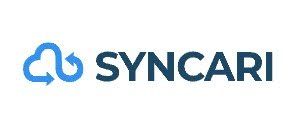
Overview
Syncari is a leader in Autonomous Data Management (ADM), designed to streamline enterprise master data management (MDM) for real-time decision-making and AI-readiness. The platform enables organizations to integrate, manage, and activate data seamlessly across various systems, ensuring accurate and actionable insights. Syncari's solutions are trusted by businesses globally for their capabilities in global compliance, omnichannel marketing, and data activation. By modernizing data management processes, Syncari helps organizations optimize their data for improved customer experiences and operational efficiency.
Key Features of Syncari:
- Data Management Hub: Provides flexible, reusable data integration pipelines and services for comprehensive enterprise MDM.
- Multi-Directional Sync: Ensures data integrity across platforms, facilitating real-time decision-making and optimal operational efficiency.
- Transformations and Custom Functions: Adapts to specific business requirements, enhancing data processes and automating complex workflows for scalability.
- AI Readiness: Prepares organizations for AI integration, enabling smarter and more efficient data utilization.
- 360° Data and Automation: Facilitates seamless execution of workflows and process automations based on unified data.
- Robust Data Governance: Ensures compliance with data regulations while maintaining high data quality and security.
- Omni-Channel Marketing Support: Empowers effective marketing strategies by integrating customer data from multiple channels.
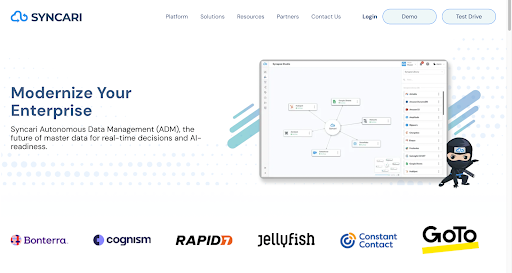
Pros:
- Real-Time Decision-Making: Provides up-to-date data for timely and informed decisions.
- Operational Efficiency: Automated workflows, saving time and resources.
- Customization Options: Highly adaptable to meet specific business needs and requirements.
Cons:
- Complex Implementation: Integration may require significant time and expertise.
- Cost Considerations: The comprehensive solution may be financially challenging for smaller businesses.
- Learning Curve: Users may need time to fully utilize all features effectively.
2. Segment

Overview
Segment is a premier Customer Data Platform (CDP) that unifies and enriches customer data from diverse sources, enabling businesses to create personalized experiences in real-time. With a zero-copy architecture, Segment consolidates interactions into comprehensive profiles, empowering marketing, product, and engineering teams to leverage data effectively. Integrating with over 450 pre-built connectors facilitates seamless data activation, driving conversions and enhancing customer retention.
Key Features of Segment
- Unified Customer Profiles: Builds identity-resolved profiles with each interaction, offering a complete view of customer behavior.
- Data Activation: Quickly activates data through a vast network of connectors, integrating with existing marketing tools.
- AI-Powered Insights: Uses AI to predict customer needs, helping marketers create targeted campaigns.
- Real-Time Processing: Handles millions of API calls daily for immediate insights.
- Extensible Integration: Easily adapts to various tech stacks.
- Zero-Copy Architecture: Reduces redundancy and ensures data integrity.
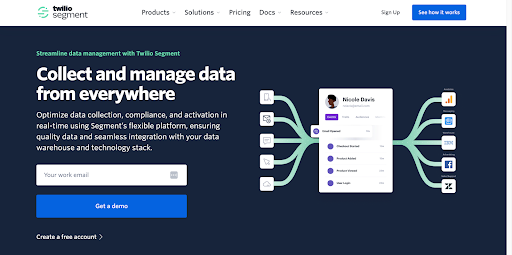
Pros
- Ease of Implementation: Minimal coding required for setup.
- Real-Time Insights: Immediate access to actionable data.
- Comprehensive Integrations: Simplifies data activation across platforms.
- Enhanced Personalization: AI recommendations boost engagement.
- Scalability: Suitable for businesses of all sizes.
Cons
- Cost: Higher pricing may deter smaller businesses.
- Learning Curve: Some features may require time to master.
- Third-Party Dependencies: Relies on external tools for certain functionalities.
- Limited Offline Capabilities: Primarily focuses on online interactions.
- Data Privacy Concerns: Inherent risks in handling customer data.
3. Profisee

Overview
Profisee is a cloud-native Master Data Management (MDM) platform designed to eliminate data silos and deliver accurate, business-ready data across the enterprise. It helps organizations overcome data quality issues that often stall digital transformation, ERP implementation, and other strategic initiatives. Profisee offers an adaptive approach to data management, allowing businesses to integrate seamlessly with existing data sources, governance rules, and workflows. Known for its scalability and quick implementation, Profisee helps companies achieve significant ROI and faster time to value.
Key Features of Profisee
- Cloud-Native Architecture: Built to scale with businesses, Profisee's MDM solution offers flexible deployment options, whether on-premises, in the cloud, or hybrid.
- Adaptive Data Management: Unlike traditional MDM solutions, Profisee aligns with existing data sources and governance policies, ensuring a customized fit for each organization.
- Rapid Time to Value: Users can get up and running quickly with Profisee's intuitive setup, reducing time to achieve measurable improvements in data quality.
- Integration Capabilities: Profisee integrates with various data sources, systems, and applications, facilitating seamless data flow and management across the enterprise.
- Data Quality and Governance: Includes tools for data profiling, standardization, and stewardship, enabling businesses to maintain high data integrity standards.
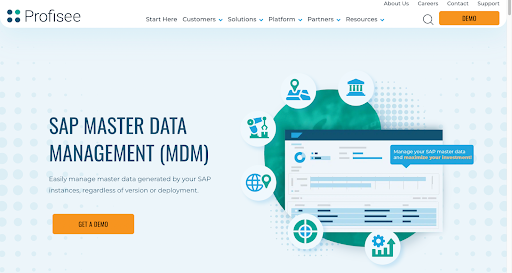
Pros:
- Flexible Deployment: Cloud-native design makes Profisee highly adaptable, whether for cloud, on-premises, or hybrid environments.
- Fast Implementation: Profisee's easy setup allows businesses to see results quickly, contributing to a faster break-even time.
- Scalability: Capable of handling growing data needs, making it suitable for enterprises of various sizes.
- High ROI: Clients have reported over 500% ROI and a 10-month break-even time frame, demonstrating its effectiveness in driving value.
- User-Friendly Interface: The platform's intuitive interface makes it accessible even to non-technical users, facilitating collaboration across departments.
Cons:
- Learning Curve: Despite being user-friendly, some users may require time to become familiar with MDM concepts and features.
- Pricing: The cost of Profisee may be a barrier for smaller businesses, especially those new to MDM solutions.
- Dependence on IT Support: While it aims for simplicity, complex data environments may still require IT support for optimal setup and maintenance.
- Focus on Data Quality: As a specialized MDM solution, Profisee may not cover all data management needs outside of data quality and governance.
4. Pretectum
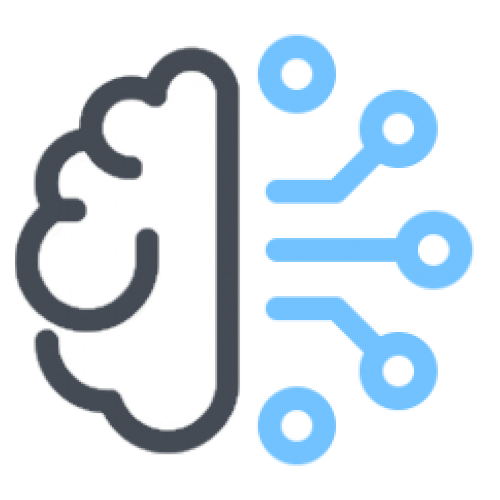
Overview
Pretectum Customer Master Data Management (CMDM) is a cloud-based platform that helps organizations address the complexities of fragmented customer data. It is designed to consolidate data from various systems like Customer Data Platforms (CDPs), Enterprise Resource Planning (ERPs), and Customer Relationship Management (CRMs). By unifying these sources, Pretectum CMDM creates a "golden record" for each customer, providing a centralized and accurate view of customer information. This approach enhances operational efficiency and decision-making and enables deeper customer engagement, resulting in better overall customer satisfaction and loyalty. With its robust customer data governance and customer consent management capabilities, the platform supports organizations in maintaining high data quality and compliance standards.

Key Features of Pretectum
- Data Consolidation: Integrates data from multiple sources into a single system, offering a comprehensive view of customer information for effective customer loyalty data management.
- Real-time Synchronization: Ensures customer data is updated across all systems, facilitating timely and informed decisions.
- Flexible Management: Adapts to diverse industry requirements, providing tailored customer data management processes.
- Robust Data Governance: Maintains high customer data quality while complying with security and privacy regulations, which is essential for effective customer data governance.
- Integrated Customer Data Quality Management: Ensures the accuracy and consistency of customer information across systems.
- Customer Master Data Deduplication: Eliminates duplicate customer profiles through duplicate record remediation, enhancing data integrity and reliability.
- Customer Search Optimization: Natural language and AI-powered, it improves the efficiency of locating customer records and relevant data, supporting streamlined workflows and quicker access to insights.
- Customer Self-Service Data Verification and Consent: Creates awareness of the data held and enhances the overall quality of zero-party data (ZPD) to create trust and transparency accompanied by the ability of the customer to provide tracked consent for the use of their data.
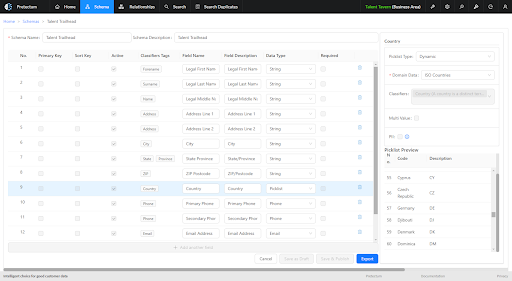
Pros:
- Enhanced Customer Insights: Offers a unified view that better understands customers.
- Operational Efficiency: Streamlines workflows with real-time data synchronization, saving time and effort.
- Data Security Compliance: Adheres to regulatory standards, ensuring data privacy and security.
- Versatility: Integrates with various business systems, making it adaptable to different industries.
Cons:
- Complex Implementation: Integrating multiple sources requires time and expertise, especially with existing infrastructure.
- Costly for Small Businesses: The comprehensive solution may be less accessible to smaller organizations due to cost.
- Customization Needs: Tailored configurations may be needed for optimal alignment with company requirements, adding to set-up time.
Insert Video: https://youtu.be/pkZf6IwPKnc
5. Informatica

Overview
Informatica is a leader in cloud data management, offering an AI-powered platform that prepares data for AI applications while ensuring compliance with regulations. Its Intelligent Data Management Cloud (IDMC), driven by the CLAIRE® AI engine, manages diverse data types across multi-cloud and hybrid environments. This end-to-end platform accelerates AI readiness, helping businesses maximize the value of their data assets with reliable and governed data solutions.
Key Features of Informatica
- IDMC: Integrates data across various environments, handling diverse data types.
- CLAIRE® AI Engine: Automates data processes, enhancing integration and governance.
- Data Quality: Ensures data is accurate and compliant, supporting AI initiatives.
- Flexible Pricing: Adapts to different business needs with a consumption-based model.
- Holistic Integration: Facilitates dynamic data movement and transformation.
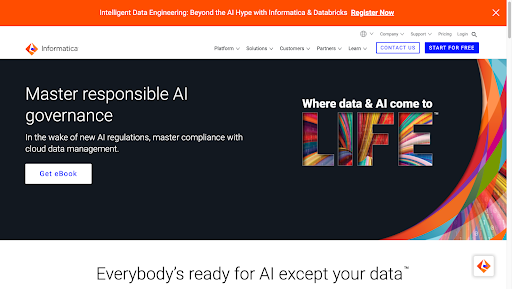
Pros
- Comprehensive platform for data integration and management.
- Advanced AI capabilities with CLAIRE® for optimized data use.
- Recognized industry leader, especially in data quality.
- Scalable for businesses of all sizes.
- Focuses on compliance with AI regulations.
Cons
- Complex setups may require time and expertise.
- Cost may be high for smaller businesses.
- Requires AI knowledge to fully utilize features.
- Steep learning curve for new users.
Conclusion
The top 5 Customer Master Data Management (MDM) solutions of 2025 provide robust, scalable, and secure platforms for managing customer data. These tools ensure data accuracy, real-time integration, and compliance while offering advanced features like AI-driven analytics and customizable workflows. As businesses increasingly rely on data for decision-making and customer engagement, investing in a reliable MDM solution is essential for improving governance, optimizing relationships, and staying competitive in 2025.
ⓒ 2025 TECHTIMES.com All rights reserved. Do not reproduce without permission.




